A while back, Zindkeeper asked a quick question about the first Kingdom Hearts game:
Since we’re on the subject of ”Oh, this is…” phrases, and sorry if you already handled it before, but there’s been some awkwardness found in the original Kingdom Hearts’ translation. In Disney Castle at the beginning of the game, this happened:
Donald: “Daisy, can you take care of the…”
Apparently, according to one FAQ writer, this is completely wrong. Daisy was supposed to say “Take care” to Donald and Goofy in response to Donald saying something else. Could you possibly shed some light on this one, when you have time?
This was easy to look into, especially thanks to YouTube user Everglow8444, who has full videos of the Japanese and English re-releases. Thanks for being so thorough!
So here’s the line in question in both versions:
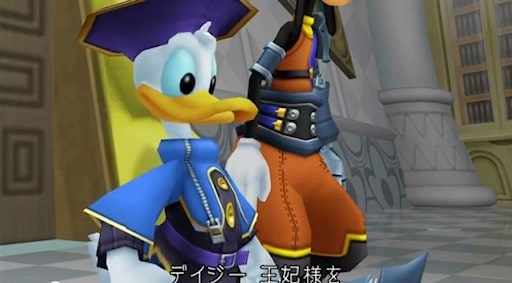 | 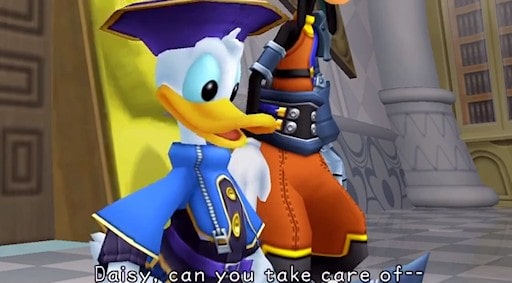 |
| Japanese HD version | English HD version |
The question is if this English translation is wrong, and the answer is… nope. It’s perfectly fine. It might seem a bit unusual for folks still studying the language though, so I can totally see why it might seem a bit odd at first.
In the Japanese line, Donald says:
デイジー、王妃様を
It’s difficult to translate this line super-literally because it’s actually technically an incomplete sentence! Incomplete sentences are extremely common in Japanese and it means reading between the lines is an important skill you need when using the language. Part of the reason incomplete sentences are so common in Japanese is that verbs generally come at the end of sentences (“I dogs sell”), unlike with English (“I sell dogs”). And if the situation or context is already obvious, then including the verb isn’t really necessary.
Of course, this causes a problem when trying to translate, since in English we usually need to include the verbs, as they’re generally smack in the middle of our sentences.
So, with all that in mind, the Japanese line is literally saying:
Daisy, (missing verb) the Queen.
And given the context, it’s pretty clear the verb should be something like “look after” or “take care of”.
The English translation here keeps the line as an incomplete sentence by filling in the verb and leaving out the object:
Daisy, can you take care of–
It actually wasn’t necessary to keep the line an incomplete sentence in English, but perhaps there was lip flap or timing issues at hand too.
Whew! Hopefully that clears things up!


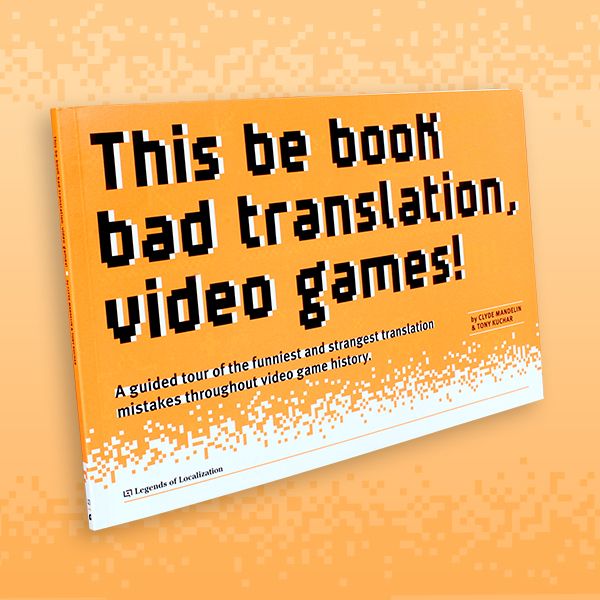

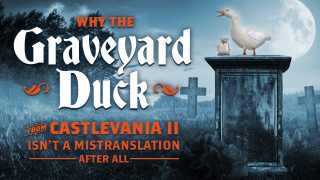
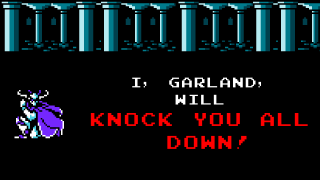
That’s pretty interesting, but considering the grammar differences, even if I didn’t know a little Japanese, I would agree that was the proper route to take.
I haven’t played the game, but could you could transalte it as “Daisy, the Queen…”? That seems like it would make sense depending on the context, although the tone is a bit more commanding.
Sure, that’s a possibility too, although it might give the impression that “the Queen” is the subject of the incomplete sentence. Which isn’t necessarily bad, but spelling it out the way the official translation does is the standard translation approach and makes things clearer. I guess it was just the choice to leave the sentence incomplete in translation that caused any confusion at all.
Maybe, but how would that sentence end? “Daisy, the Queen take care of?” Doesn’t make much sense.
Unless you’re arguing that the sentence is something along the lines of “Daisy, the Queen is…”, which unfortunately doesn’t fit. It’s important to note that the Japanese sentence ends on を, otherwise known as the direct object particle (read: something acting on something else), leaving no doubt that what follows in the Japanese will be the speaker telling Daisy to (something) the Queen.
airco, can you translate the…
The localizers probably wanted to make it clear that he was making a request, which is also pretty clear in Japanese. “Daisy, the Queen…” sounds like he’s reminiscing or something.
But then it would be a pretty bad translation, since it disregards the grammatical rules of the target language and/or word it in an unnatural way.
If the information was too important to omit, they could use “Daisy… you must… the Queen..” if the scene has dying speeches, but it’s not always possible and wouldn’t certainly suit the situation at hand.
Not only that, Japanese repetitions of words is extremely common, you would find someone using third person to refer to the person he’s talking with, or sometimes to HIMSELF… You find them using particles, speech patterns and formal/informal particles. All of that would be mostly lost in translation because that’s how languages are.
Oh, I’m not saying it would be *better*; the official translation seems to be the best approach.
“Daisy, the Queen[; could you take care of her?]” would be fine grammatically, no? As I said, I haven’t played it, so maybe it wouldn’t really work in context, but I was just suggesting that certain cases you *can* omit a verb in English and it’ll still make sense.
“Daisy, the Queen; could you take care of her?” while grammatically correct, doesn’t sound natural.
Clearly the best translation would be “Daisy, the queen is your…”
The context of the scene is Minnie learning that Mickey has taken a leave of absence. The script in English goes like this:
Donald: Your Highness. Don’t worry. We’ll find the King, and this ‘key’.
Minnie: Thank you, both of you.
Donald: Daisy, could you take care of (the)-
Daisy: Of course. You be careful now, both of you.
Donald actually means to complete the question, but Daisy cuts him off to agree unconditionally. A non-standard order placing Minnie first would be inappropriate because it would mean he planned for interruption, which doesn’t make any sense.
He doesn’t mean to complete the sentence in the Japanese version, but the lipsync is redone for the English version to make room for a longer line, so this length edit doesn’t matter.
Ideally the voice script would have completed the sentence for Daisy to talk over.
Strangely, a book on learning Japanese told me the opposite. It said that, while in English you NEED the subject, Japanese does not require it for a sentence to be “complete”. However, they DO need the verb.
I love reading about different cultural expectations with using language. Like here, with trailing off at the end. As a language nerd, I’d like to read an alternate history story where Japanese became the dominant language of Hawaii. It’d be interesting to see how a more laid-back culture would adapt the language to their own ends.
PS: The Japanese Final Mix version contained the English voices with Japanese subtitles. I heard that Japanese dubs are terrible. At least, Japanese gamers think so. There was a huge outcry when a Modern warfare game didn’t have the original English voices.
Oh, actually, that’s completely true about subjects too – a lot of the time Japanese sentences won’t include subjects either. You can have Japanese sentences with unstated subjects and unstated verbs and still get the complete message across, thanks to sentence particles.
Disney characters sound plain dreadful in Japanese in my opinion. People need to stop praising Japanese as the all-encompassing language for everything. Plus according to some rumors, Nomura loves the English Disney character voices, which is why Final Mixes tended to be English dubbed with Japanese subs.
I didn’t think you’d ever actually see this old question of mine. Thank you for taking the time to look this one over. It makes much more sense to me now. I doubt that FAQ writer is around anymore, but at least this will clear up this mystery that’s been bothering me for a while.
I actually have a big spreadsheet of all the requests I get plus a special inbox for other requests that I’m too lazy to input into the spreadsheet. Whenever I do an update, I usually pull one from there based on how much free time I have (usually only half an hour in the morning). So I try to get to every request eventually, just some will take a lot longer than others – there are still some from May that I haven’t gotten to, for example :X
Ah I see. Again, thank you for taking this one.
Frankly, I had assumed Donald was talking about his nephews there. The lack of a specific noun means it’s up for interpretation. Now I know they meant take care of Minnie, but that’s lost in translation I would say.
Same here, I though he meant kids or nephews – which made no sense since the nephews are in Hollow Bastion. Never thought he meant the queen.